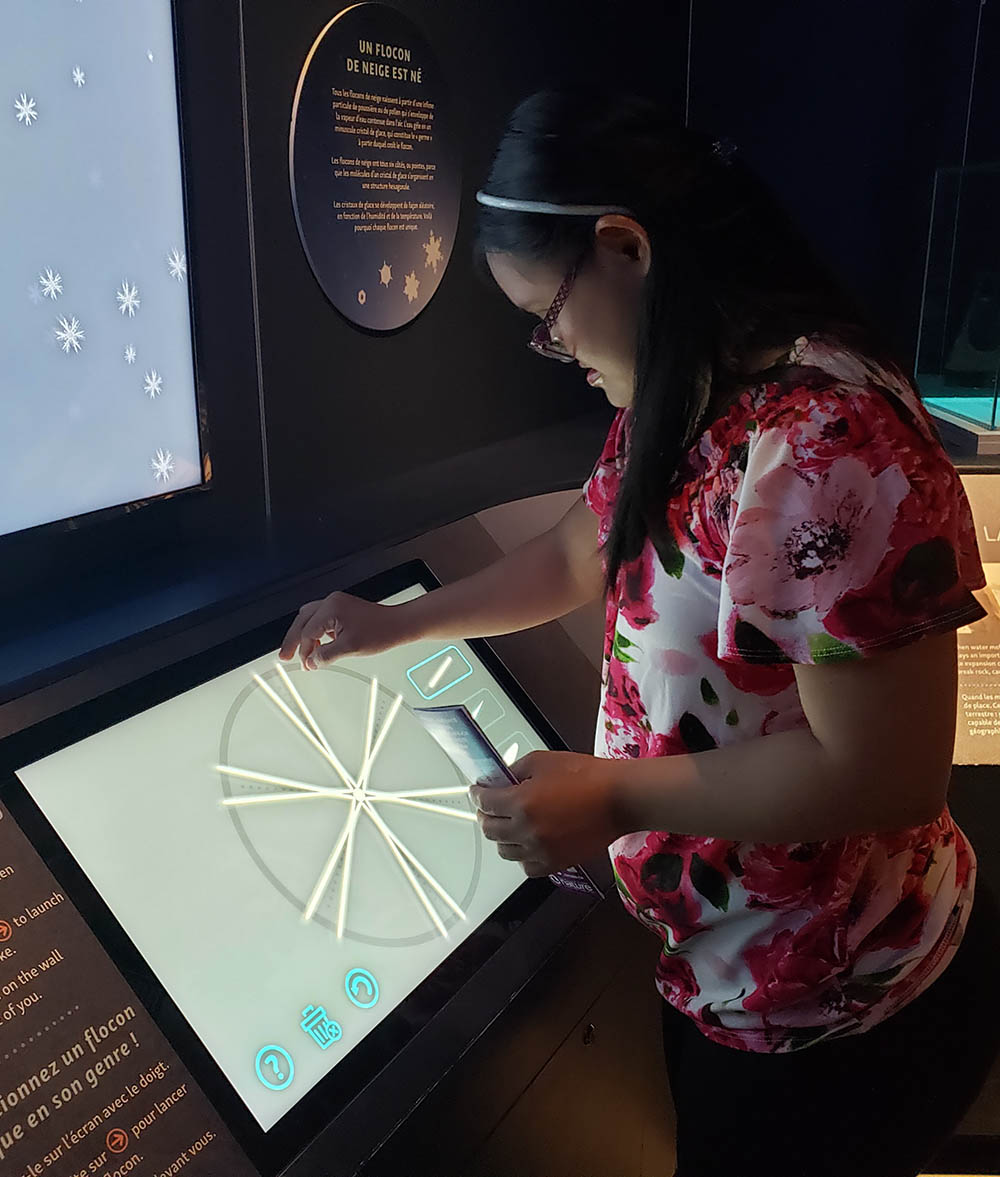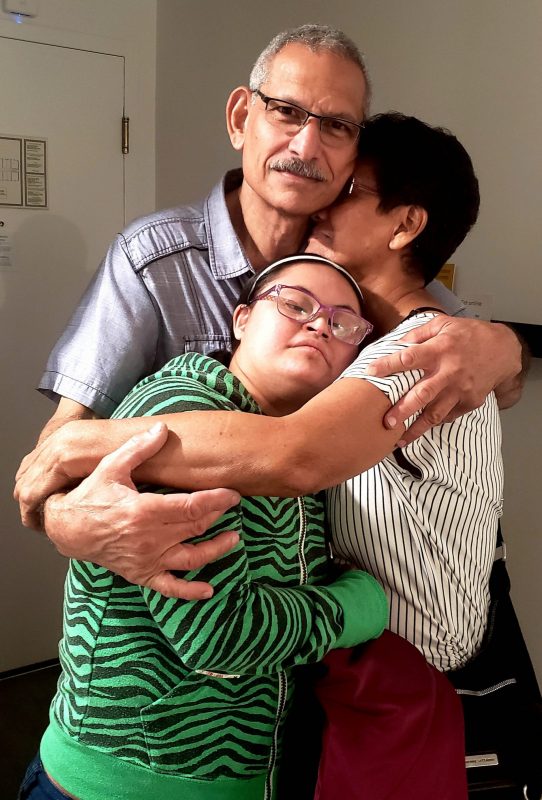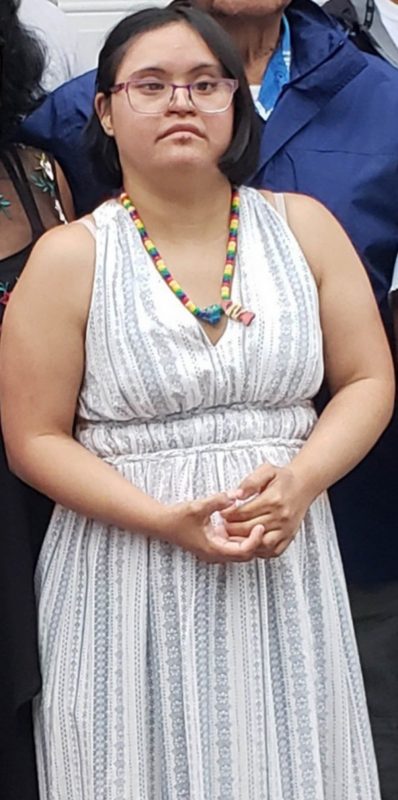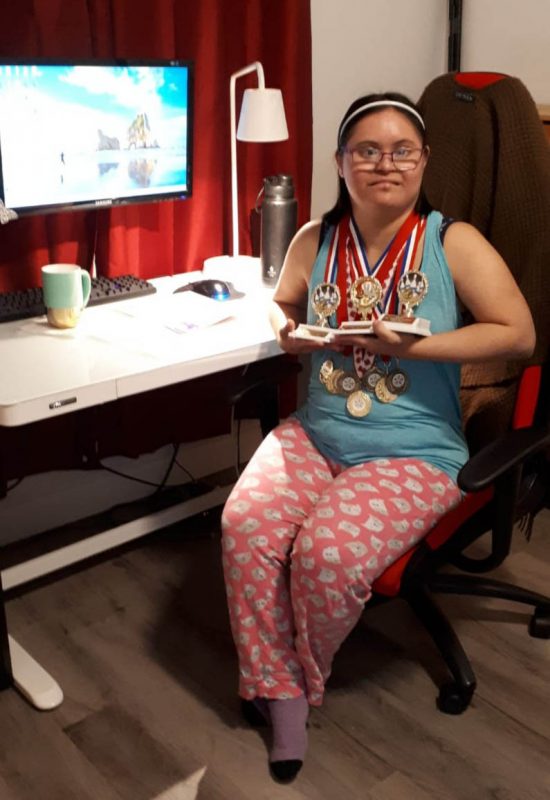Guyana-born Jana Gomes, of Ontario, Canada, is a nurturing, happy-go-lucky 28-year-old, who like many people her age likes music, videos, art and is tech savvy.
Jana also likes a good day’s work, cleanliness and fair play and is outspoken—sometimes to the point of discomfort for her parents, who say she sees things in black and white.
Jana also has Down syndrome—a fact that you might not suspect based on the sporting accolades she has won for her schools and herself, including medals and trophies for cross country races and bowling. She can also row a canoe and swim.
“I like sports, computer games but I do not like a dirty house. I help to clean, cook and look after Blanco (pet cat), who is old like me. I like going to work,” Jana told Stabroek Weekend in an interview from her Pickering home. She volunteers at the Salvation Army Thrift Store in Scarborough.
“I like BTS (the Korean pop band), Alicia Keys, Backstreet Boys and Michael Jackson. I like the Golden Girls because they are entertaining.”
Stabroek Weekend spoke with Jana, and her father, Mark Gomes, and mother, Jackline, who shared their experience in raising a special needs child.
According to the Mayo Clinic website, Down syndrome is a genetic disorder that varies in severity among individuals, causing lifelong intellectual disability and developmental delays. “It’s the most common genetic chromosomal disorder and cause of learning disabilities in children. It also commonly causes other medical abnormalities, including heart and gastrointestinal disorders,” it explains.
When Jana was born, Mark said, “We didn’t know anything about Down syndrome. We were worried about her being a liability to those around her. You know the stigma around disabilities in Guyana.”
One day, Mark found a book about Down syndrome and how children with it can live normal lives. He read it and shared it with Jackline. “We got a better understanding of what we were in for. In those days in Guyana, they did not do checks for disabilities before birth but the moment she was born the doctor knew and informed us. Our family friend, Dr Francis Bailey, carried out a series of tests and she did not react to some of the tests expected of a child with Down syndrome. But she took forever to do develop as a normal child would. She took forever to walk and forever to get teeth. We joked about having to get her dentures.”
The parents of three boys (one of whom died), they compared her development with them. “There were some things she wasn’t supposed to do like two motor functions at the same time. When you get a set of normal children and then one with special needs, everything the one with special needs does becomes a milestone and something to celebrate. When I saw her walking and bouncing a ball, two motor functions at the same time, that was a big deal. It is something as a parent I will remember for the rest of my life. Her first step was a joyous experience. You rejoice in every little achievement.”
Despite their earlier apprehensive approach to her development, they never treated her differently and she never behaved differently. “I don’t think she even knew she had a problem until very recently. Up ’til now she doesn’t behave like that.”
Jackline noted that from a very young age, Jana was “A very caring, compassionate but outspoken person. We took her wherever we went. In Bourda Market, the vendors knew her. We gave her a basket and she walked around with it. The vendors gave her fruits and wouldn’t accept payment.”
One day in Bourda Market, a woman peeled a banana and threw the skin on the ground. Jana picked up the banana skin, put it in the lady’s hand and pointed to the bin. According to Jackline, “The lady said, ‘Oh my God. It takes a baby to embarrass me’.”
Early schooling
Mark recalled when they took Jana to St Jude’s pre-school in Georgetown children were crying but not Jana. “That first day she walked around comforting the other children with tissue in hand.”
After that it was on to St Gabriel’s Nursery and St Gabriel’s Primary. “In primary school, some tried bullying her. One day, when I went to pick her up. She wasn’t in her usual place. I found her with the children in a higher class who were looking out for her.”
She did not do phonics at school because she had a speech impediment. “The tongues of down’s syndrome children are long. So they can’t form words properly. There are some who had their tongues shortened surgically in order to speak better. Now you can understand her except for when she gets excited or if we are talking about sports. However, she knows how to articulate to get her message across,” Mark said.
Jackline chipped in, “If you are talking about things she doesn’t understand, she goes on the computer and research. When I started to use the computer and couldn’t find my way around, she said, ‘Mom come let me help you’. I learned a lot about the computer because of her.
Initially because she couldn’t read or write she found other ways to cope. Now she does both.”
At six years old they moved her to School of the Nations, where there was a more structured programme for special needs children. In 2003 the family migrated to Canada just before her ninth birthday.
In Stouffville, Ontario she attended St Brigid Catholic Elementary School, where she was the only special needs child and was assigned a specialist teacher until 2007. There she enjoyed cross country running and handball in spite of a leaky heart valve. For completing several cross country races among normal children she received several medals over the years.
When the family moved to Scarborough in 2007, she was placed at another Catholic school where a programme was in place for special needs children. In Stouffville, she was formally taught to use the computer.
Earlier in 1999, Mark and his eldest son had spent the Christ-mas in Stouffville and Mark’s cousin gifted him an IBM computer, his first computer.
“When we went back to Guyana we had to learn to use it. We had the dial-up in those days. It was always the boys and me. Jana never complained about not getting time on the computer but when the boys weren’t around, she would jump on it and push all kinds of button. We would catch hell to try to find things back. Eventually things improved. She started being a little more organised. Johan and Nicky had a playlist of 1,500 songs which was a very big file in those days. Every time Jana went on the computer [we would] hear the same songs playing over and over. I wondered how she found those songs because they were all scrambled and not in any specific order. One she liked was ‘Highway to Hell’, an AC/DC band song. She likes hard rock. Then I realized she had a very good memory. She has her unique way of finding things around the files. To a point she taught herself the use of the computer.”
When she moved to Canada, she was taught information technology formally at school and she improved considerably in the use of the computer.
Even before migrating, Mark related that one day he and Jana were visiting a friend who had just returned to the country with a stereo set that had a remote. “That was top notch technology in those days.” The two were talking when they heard music coming from the bedroom. No one else was in the house. “There was Jana playing the stereo. My friend was like how the hell she knows to play that thing. I would’ve had to try to figure out how to use the remote. She was eight years.”
Mark recalled, too, when he got his first smart phone in Canada, it came without a manual and he had to figure out how to use it.
“I left it on the table. Next thing I see Jana taking out pictures of me. She had already figured out most of the controls on the phone before me. Till now she has that ability to figure out the technology.”
Before arriving in Canada, Jana had an Ipod with multiple languages. “She had a ton of music on it. One day while driving in Georgetown, she heard a song on the radio. She said, “Dad I got that on my Ipod. She found it really fast and started playing it. At the time she did not know to read or write. Now she does. One day I picked up her Ipod and the entire playlist was in Chinese. I was upset. The menu was in Chinese. I gave it to my son Johan to see if he could readjust it. He messed with it for a while, couldn’t undo it and gave it back. He told her she has to get it back in English. In less than 30 seconds she had it back in English.”
When they take her to the gym in Scarborough, according to Jackline, “She jumps on those machines that you have to programme, punches in the keys and gets in.”
High school
At Francis Lieberman High School in Scarborough, Jana was in a special needs class, where she assisted in maintaining order. However, because of her aptitude, she did a number of subjects, including art and history in the regular classes.
A lover of history she is particularly fascinated with Egyptian history and is knowledgeable about a number of pharaohs.
Jackline said, “She amazes people on her knowledge of a famous Egyptologist and on Egyptian history.”
At high school, Mark related, there were autistic children who became violent and walked out of the class. “Some of the children were pretty big compared to the teachers. When they walk out of the class Jana would talk to them and bring them back into the class. I don’t know what language she spoke because her speech was not clear in those days. The teacher said she was like the sheep dog keeping the flock together. In school, she said ‘Hi’ to everyone by name. Such is her memory.”
At high school, she was awarded a medal for nurturing.
At Francis Lieberman she won several trophies for bowling in Ontario’s mini Olympics for special needs children. The school also has a Best Buddy Programme in which children from the regular classes volunteered to be buddies to the special needs children.
“Jana had a regular person who ‘hang out’ with her and got her to do other things. Their classroom in that school had not only school stuff, but equipment and household appliances like stoves and washing machines to teach them life skills.” Jana does her own laundry, cooks rice and pasta and does TV dinners.
Volunteering at work places is also a part of their school programme so Jana did her full share at a number of places, including Walmart, Dollarama and a sports store.
Mark said, “She always get glowing reports from her supervisors and managers. When they give her a task she does it and when she’s finished she asks what else is to be done as opposed to her peers who would be on the phone or talking with coworkers. In her case they would encourage her to talk with a coworker. She is very meticulous and likes perfection.”
Jackline, who works at the Salvation Army Thrift Store in Scarborough, noted that she was offered a job after Jana had done voluntary work there. Jackline had asked if she too could have volunteered with Jana to ensure she adjusted well to the environment.
Jana still volunteers and voices her opinion when she sees the need. Jackline said one day a coworker left a bowl of food on a table when another coworker attempted to open it. Jana immediately asked her why she was opening some else’s food.
She has taken to task other workers for being dishonest as well. “For Jana, if it is black it is black. If it is white it is white. Jana is very observant.”
Recently Jackline said, their district manager told the workers to wear gloves on the job and Jana who was nearby told him he was not wearing any. Afterwards all red in the face, he told Jackline, “God, Jackie, Jana embarrassed me.”
Jackline noted that Jana has a way of knowing whether someone likes her or not. “If she likes you she will carry on a conversation with you.”








